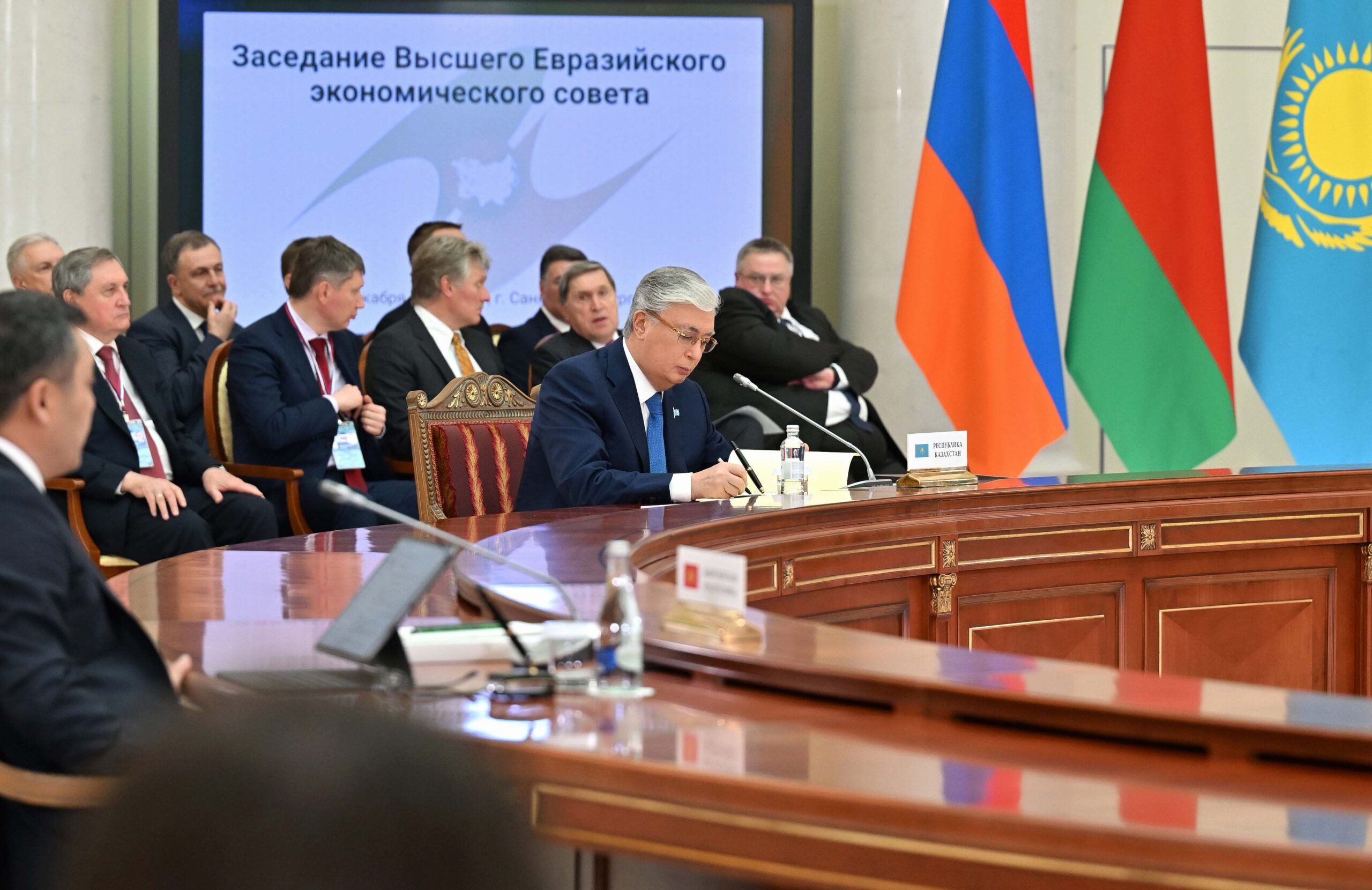ASTANA – Kazakh President Kassym-Jomart Tokayev addressed technological cooperation, integrated information systems, and food security of the Eurasian Economic Union (EAEU) at a Dec. 25 meeting of the Supreme Eurasian Economic Council (SEEC) in St. Petersburg, reported the Akorda press service.

Photo credit: Akorda
The talks began with a narrow-format meeting that included Prime Minister of Armenia Nikol Pashinyan, President of Belarus Alexander Lukashenko, President of the Kyrgyz Republic Sadyr Zhaparov, President of Russia and SEEC Chairman Vladimir Putin, and Eurasian Economic Commission Chairman Mikhail Myasnikovich.
The meeting participants addressed key directions for developing the EAEU integration processes and plans for international cooperation in 2024.
The meeting in the expanded format was joined via video call by President of Cuba Miguel Mario Diaz-Canel Bermudez, the head of the EAEU observer state.

Photo credit: Akorda
Addressing the meeting participants, Tokayev reiterated some of the key factors that slowed down the pace of development of the global economy, including inflationary pressure, the transformation of international supply chains, regional conflicts, and sanctions. He noted that the EAEU states achieved positive dynamics, encouraging his counterparts to prepare for the challenges of 2024.
Technological cooperation
According to the President, one of the priority tasks is developing technological cooperation between the EAEU states in the real sector of the economy. The widespread introduction of advanced technologies and innovations will strengthen the EAEU’s position on the world stage, he said, welcoming the reflection of this aspect in the Eurasian Economic Path declaration, which is associated with China’s Belt and Road Initiative.

Photo credit: Akorda
Free movement of goods
Tokayev called on the meeting participants to focus on fully implementing the freedom of movement of goods, the fundamental basis of the EAEU. Despite the opening of customs borders, each country continues to protect domestic producers from competition with other EAEU members.
“We have to eliminate existing barriers and restrictions on the common market, as well as speed up the introduction of uniform technical regulations. Full-scale operation of the EAEU integrated information system would significantly reduce business costs when moving goods between participating countries. There is great potential for productive interaction in e-commerce. Last year, the total volume of this market in the EAEU reached $80 billion. In the near future, this figure may double,” he said.
Food security
The President addressed the agro-industrial complex as another important area of cooperation. The share of exports of agricultural products from the EAEU countries on the world market remains extremely low, accounting for just over 2%.
“This comes at a time when more than 800 million people around the world are experiencing hunger and food insecurity. Food supplies, unfortunately, are hampered by the current geopolitical situation, where sanctions have come to the fore. As a result, people in need of food suffer. Meanwhile, according to experts, the potential of the EAEU countries will allow them to feed nearly 600 million people. Therefore, establishing close cooperation ties to produce competitive, environmentally friendly and export-oriented products that meet advanced international standards should become one of our priorities,” Tokayev said.
IT industry
Tokayev reiterated that Kazakhstan stands for the comprehensive development of cooperation in digital technologies and artificial intelligence. He proposed the EAEU states consider the possibility of building a fiber-optic communication line along Russia – Kazakhstan – Iran route to connect to existing international lines running along the coast of the Indian Ocean.
According to Tokayev, this will both create an alternative route for transit traffic in the Eurasian space and significantly strengthen the position of the EAEU in data logistics at the global level.
He also emphasized the importance of strengthening the EAEU potential on the external market and developing trade and economic relations with third countries and integration associations.
“We welcome the signing of a full-scale free trade agreement with Iran, which occupies an important place in the system of our trade and economic relations. Work in this direction should be continued with Egypt, India, Indonesia, Mongolia, the United Arab Emirates, and other countries,” said Tokayev.
Following the meeting, the participants adopted a number of documents and elected Bakytzhan Sagintayev of Kazakhstan as chair of the Eurasian Economic Commission starting Feb. 1 next year.
From Jan. 1 next year, Armenia will take over the EAEU chairmanship from Russia for one year.
